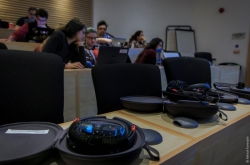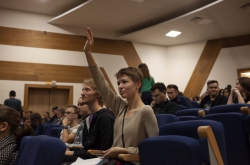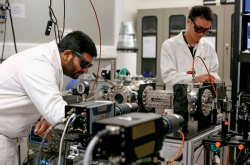Any student who’s taking their program on a tuition-free basis can get this kind of support. Apart from acquiring new knowledge and establishing useful contacts, as well as presenting their results at international conferences, the students who didn’t participate in semester-long exchanges get an additional bonus: taking part in short-term events at ITMO’s various partner universities can help them decide on the university they would like to go on a semester exchange to. What’s more, this gives students an advantage when applying for participation in other mobility programs.
ITMO.NEWS interviewed several students who won the partial funding competition for participating in short-term events and programs in late summer/early fall of 2018.
Alena Rotaru, 2nd year Master’s student, Faculty of Software Engineering and Computer Systems, participant of the Experimental Interaction Design Summer School at Tallinn University, Estonia
I participated in the Experimental Interaction Design summer school in Tallinn University. The course took two weeks and was dedicated to the fundamentals of new media, interaction design, multimodal and other types of digital environments, and involved developing a prototype of a wearable device for the field of healthcare. Despite the lack of time, we’ve succeeded in developing our projects to the stage of a working high-fidelity prototype. My team’s project focused on creating an armband that would identify epileptic seizures in children under the age of 14.

The course helped me brush up my skills in 3D modeling, get the experience of soldering and working with a 3D printer, learn a lot about different sensors, and establish many useful contacts. I believe that my field offers limitless opportunities for development, and I’m interested in not just UI/UX, but also digital marketing, project management and data analysis. For this reason, I try to make use of every opportunity to improve my skills or learn something new from the adjacent fields. There’s no such thing as having too much knowledge, and at this particular summer school in Tallinn, I also got to benefit from what I like most in modern education: its interdisciplinary nature and the “learn by doing” approach.

I really like it that ITMO University offers such opportunities to its students. I know that financial issues are very relevant for many of those who want to get new experience, and the support offered by ITMO University can be a huge help; in my case, it was really important, as it fully covered my trip to Tallinn and living expenses.
Mark Selyaev, 3rd year Bachelor’s student, Information Technologies and Programming Faculty, participant of 2018 Wolfram Summer School at Bentley University in Waltham, Boston, USA
The summer school at Bentley University that I participated in is an annual event organized by the Wolfram Research company. The three-week course involves training sessions with the company’s representatives, including those focusing on R&D. Each participant also got a mentor who helped them work on individual projects. We studied the Mathematica programming language, and every evening, we got additional training on particular topics that we decided on by vote. During these sessions, we could enquire about various issues in a more informal manner. Oftentimes, we sat there far into the night, as we lacked time until the end of the summer school to finish our projects.

At the Wolfram Summer School, I got to know a researcher from the Wolfram company who specializes in image recognition. We found many shared interests, and he supervised my project on finding important parts of an image and auto-cropping it in a meaningful way. We still communicate with each other, and collaborate on improving the project’s results.

About 50 students from all over the world participated in the summer school; apart from me, there were a couple other Russian-speaking guys. We all lived and studied in Boston, at Bentley University. This was my first trip to the USA, and I am really glad that I got the experience of living on the university campus for three weeks, as I could learn more about the American student lifestyle. Apart from that, I met some students from MIT, who showed me around their university, as well.
I applied for financing a month before my trip, had it approved by my department head, and got the approval of the international educational programs department in some week’s time. As the result, the university covered about 70% of my expenses.
Svetlana Shusharina, 2nd year Master’s student, Faculty of Technological Management and Innovations, participant of “Promising development trends of national IT” conference at Sevastopol National Technical University
Attending conferences outside of your home university is very important, as it gives you an opportunity to leave your comfort zone and look at everything, research tasks included, from a different angle. In late September, I participated in the 4th “Promising Development Trends in National IT” conference that was hosted by Sevastopol National Technical University. The conference brought together both scientists and representatives of authorities and business, and I have to note that I really liked this systemic approach to solving relevant tasks. Me and my peer did reports in the “Smart City. IT products and services” section: Polina Smirnova presented her research on applying gamification in training government employees, and I talked about using e-governance as a means to solving urban issues.

The participants were quite interested in our presentations, they asked relevant questions and discussed opportunities for collaboration. The conference’s goal was to not just share efficient practices, but to also identify promising trends in national IT. Among other things, this helped us to come up with new ideas for our future research.
The application process for getting financial support from ITMO was quite simple, and with the university’s help, I succeeded in covering most of my expenses for the trip. That's why, I advise everyone to consider this great opportunity.
Vadim Davydov, 2nd year Master’s student, Faculty of Information Security and Computer Technologies, participant of EPITECH Bootstrap Summer School, Paris Graduate School of Digital Innovation (EPITECH), France
The three-week summer school was organized by EPITECH, ITMO’s partner university that’s quite well-known in Paris. The educational program was designed as follows: the first week was dedicated to working with the command string, the second to a programming field of choice (they offered two topics and we had to choose one in advance: blockchain and the Internet of Things), and the third to individual projects. My research interests span a broad range of topics, so I was interested in studying the blockchain technology and making a project in this field.

To my mind, this was an exciting experience, and not just from the academic standpoint. I got to live with a French family, spoke French a lot and went to interesting places. This wasn’t my first time studying in Paris on an exchange program, and I didn’t learn anything essentially new, but I still got to refresh my experience, communicate with colleagues, and visit a new university.
By applying for financial support from ITMO University, I succeeded in reimbursing 70,000 rubles (about 900 EUR -- Ed.), the fee for the program being 1300 EUR. This included the costs for living with a local family, catering at the university, tuition fees and all recreational activities, as well as transfers on arrival and departure.
Anastasia Pisareva, 4th year Bachelor’s student, Information Technologies and Programming Faculty, participant of Business Process Management and IT Summer School at HU University of Applied Sciences Utrecht, the Netherlands
In the course of the several years that I’ve studied at ITMO University, I succeeded in getting lots of valuable experiences, and the most remarkable ones had to do with studying abroad. I got training in Business Process Management and IT at the Utrecht summer school, as well as participated in an exchange program at Tampere University of Technology in Finland. It’s hard for me to explain how important such experience is from both the professional standpoint and in relation to getting skills in international communications. Still, it’s quite indicative that I would’ve gone on all these programs once again, and I strongly advise everyone who’s interested in such things to make the most of these opportunities.

Utrecht summer school is a course by Utrecht University. I choose this place to take a program at due to its high position (52th place) in the subject ranking. What’s more, the costs for the course were also quite affordable when compared with those of other summer schools by top-tier universities. The summer school took place in the course of two weeks from July 28 till August 10. As I am currently developing my skills in the fields of IT and business analysis, this course came as a great opportunity.
Having considered my application, ITMO University covered the whole of my tuition fee, as well as my transport costs. The application procedure is more than simple: all you have to do is gather necessary documents, including the application, certificate of English language proficiency, and an invitation from the host institution.

Now, I feel that these trips have given me a particular competitive advantage, and I don’t plan on stopping in my development. It is really stimulating when you’re communicating with like-minded people who aim at common goals. Another awesome thing about participating in exchange programs is that I continue to communicate with the different people I studied with, we stay in touch in social networks, and I know I can visit them in their home countries.
Tatyana Sirichenko, 2nd year Master’s student, ITMO University Biochemistry Cluster, participant of a summer school at the University of Jyväskylä
The summer school at the University of Jyväskylä was aimed at getting advanced knowledge in a particular field, as well as boosting soft skills, establishing new professional contacts and a lot more. Most courses were interdisciplinary in their nature, and aimed at Master’s and PhD students. Nevertheless, there were several Bachelor’s students, as well, so I think that it mostly had to do with having the appropriate training rather than status. All of the courses were in English, including workshops where one could talk to lecturers in person and ask them any questions you liked.

For my program, I chose two courses: The Role of Non-covalent Interactions in Solid-state Properties of Materials and Data Analytics + Machine Learning + Optimization. As a person, I am very inquiring and ambitious. For this reason, I also took up computational chemistry when I was working in the field of solution chemistry at the SCAMT laboratory. This area of focus implies having good skills in what has to do with different IT instruments: working with computational clusters, writing simple scripts, applying knowledge of different programming environments and so on. This is why participating in this summer school was most beneficial for my future Master’s thesis. I still keep going through the lectures that they gave us access to: it is a unique source of knowledge, especially considering that the lectures I took were read by professors from Stellenbosch University and the University of Manchester.
The cultural program of the summer school was also great. We had different events almost every evening: from going to a sauna on some island to attending open rock concerts and eating out at local restaurants. Still, I spent most of my time at the university, studying; the most intensive task had to do with a project on machine learning: as the requirements were quite high and my skills trivial, I had to study all throughout the day. On the whole, the Data Science project was very interesting, and I just didn’t want to let go of my laptop while working on it.
Anastasia Sidorenko, 3rd year Bachelor’s student, Faculty of Control Systems and Robotics, participant of the FRUCT conference in Finland
The international conference I participated in was organized by the Finnish-Russian University Cooperation in Telecommunication (FRUCT) Open Innovation Association that aims to develop information and communication technology ecosystems in Finland and Russia. FRUCT is famous for its educational and research activities that are aimed at developing the innovative ecosystems of Russia and Finland, improving the competitiveness of PhD students and promoting cooperation between universities and research teams from the industry.

The recent conference took place in Jyväskylä (Finland) on May 15-18. My report’s topic was "A Design of Cyber-physical Production System Prototype Based on an Ethereum Private Network"; all reports were open to the public.
I admit that I was quite anxious about going to this conference, as most of the speakers there were Master’s students with enough experience in doing presentations, and for me, that would have been my first time presenting a report, and the presentation was to be in English, to boot. What’s more, in order to apply for the university’s financial support, I had to present a certificate of English language proficiency, which I didn’t have; still, that didn’t pose much of a problem, as I got free certification at ITMO.
In any case, the conference’s organizers put much effort into the event, and it went very well. We even got lucky with the weather; the university the event took place at was very beautiful, and also, there were many sociable students.
In order to partially cover my expenses, I applied for ITMO’s financial support. As the result, the university covered my expenses for transport (a train to Helsinki plus a bus to Jyväskylä, and the trip back), as well as the participation fee and daily expenses




